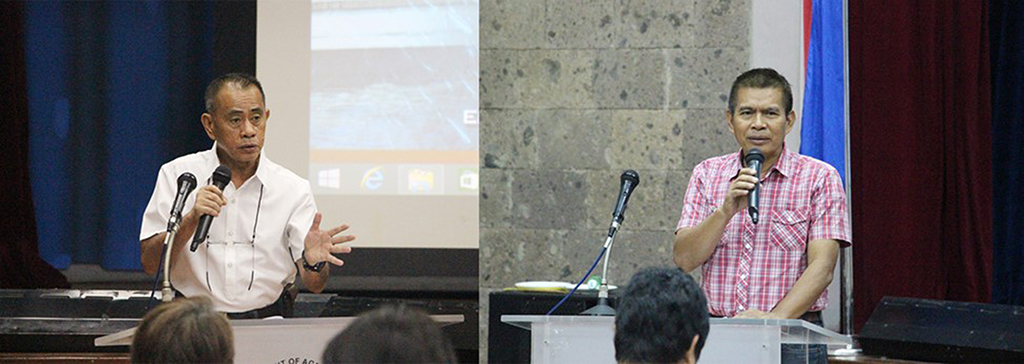
To improve the capacity of the industry to comply with the provisions of the Department of Labor and Employment (DOLE) Department Order (DO) No. 156-16: “Rules and Regulations Governing the Working Conditions of Fishers on Board Fishing Vessels Engaged in Commercial Fishing Operation,” the fisheries stakeholders convened on January 26, 2018 at the Bureau of Soils and Water Management Convention Hall.
The implementation of DOLE DO No. 156-16 orientation was organized by the Philippine Council for Agriculture and Fisheries (PCAF), partnered up with DOLE and Bureau of Fisheries and Aquatic Resources (BFAR), to identify possible areas of cooperation, including flexibilities, where support to the development of policies will improve the work and living conditions of fishers.
In his opening statement, Undersecretary for Labor Relations and Special Concerns Joel Maglunsod emphasized that the minimum protection of the fishers is needed to be instituted and the rights of the fishers should be valued according to the Article 13 Section 13 of the Philippine Constitution.
It was recalled that the guidelines for the working conditions of fishers on-board fishing vessels was agreed to be a Joint DO by the DOLE, Department of Agriculture (DA), and Department of the Interior and Local Government (DILG).
However, on May 25, 2016, the DO 156-16 was issued only by the former DOLE Secretary Rosalinda Baldoz instead of a Joint Department Order, despite having unresolved issues and without prior national stakeholder’s consultations.
Nicanor Von of DOLE – Bureau of Working Conditions (BWC) presented the consolidated issues and concerns of the commercial fishing industry during the regional consultations on DO 156-16.
Among the issues and concerns raised were basis of the issuance of DO 156-16; compensation; benefits of land-based fish workers; joint venture agreement and industrial partnership; and overlapping functions of government agencies.
In his presentation, Pedro Lim, Regional Agricultural and Fishery Council (RAFC) XIII Chairperson and Romulo Monancillo of SOCKSARGEN Federation of Fishing and Allied Industries, Inc. (SFFAII) raised that majority of the common fishers are not aware of the DO 156-16 because not all areas were considered in the consultation conducted by DOLE.
Furthermore, the private sectors realized that the DO was considered general in its form and does not address specific issues and concerns in different areas of the country.
It was then suggested to DOLE to conduct a wider consultation to further discuss the issues and concerns of the fish workers to come up with a consensus.
During the plenary session, Cesar Juaban of Sentro ng mga Nagkakaisa at Progresibong Manggagawa (SENTRO) emphasized that fish workers work 24 hours a day up to month at sea; thus, fishers should not be considered as field personnel.
Furthermore, Juaban stressed that the sharing scheme, wherein the payment is dependent on the volume of catch, is considered unfair for fish workers.
Representatives from Southern Philippines Deep-Sea Fishing Association (SOPHIL), Bisayas Alliance of Fisherfolk and Operators for Reform Inc. (BAFOR), and The Alliance of Philippine Fishing Federation Inc. (APFFI) invoked the definition of “field personnel” as provided in the Rule 25.1 of the Philippine Fisheries Code (as amended by Republic Act 10654) because it runs contrary to the DO 156-16.
Under the Philippine Fisheries Code, it was stated that fish workers, on board any fishing vessels engaged in fishing operations, shall be classified as field personnel however, in DO 156-16, it was specified that fish workers shall not be considered as field personnel.
Moreover, Monancillo recommended to DOLE that it should deploy personnel on board fishing vessels for them to fully understand the nature of the fishing sector to help in the development of policies that are appropriate for the sector.
On the other hand, SFFAII Executive Director Rosanna Bernadette Contreras requested for the revocation of the implementation of DO 156-16 until a more workable recourse came.
According to Contreras, there are still other important issues relative to the DO that need to be addressed and DOLE should not disregard substantial due process both in procedure and substance.
In response, DOLE agreed to issue a clarificatory statement with regard to the definition of the field personnel, along with the joint venture aspects.
DOLE-BWC Director Ma. Teresita Cucueco assured that should there be a certain portion that the industry would like to consider, the department is open to discuss it. However, she requested to the industry to also consider the mandate of DOLE in giving recommendations.
She also said that DOLE continuously gathers data and coordinate with its inspectors to ensure that the interest of the industry is protected.
On his closing remarks, Undersecretary for Fisheries and concurrent BFAR Director, Cmdre. Eduardo Gongona highlighted the importance of having a balance between food production and sustaining the labor force.
Gongona stressed that DOLE has to balance both interests of the laborer and other sectors to come up with a policy that is acceptable on both sides.
“We take care of the laborers because they are people who produce food, but we have to take care of the other sectors because they are the one who negotiates that kind of food that you produce and should be delivered to those who need that to generate income and employment,” Gongona said.
He further suggested to revisit the DO 156-16 and conduct an intensive and in-depth study with the direction set for the development of the country’s fishing industry.
He then acknowledged the support and efforts of the fisheries stakeholders as these contribute to the improvement of the working condition of the fishers and also to the Philippines food security.– LC











